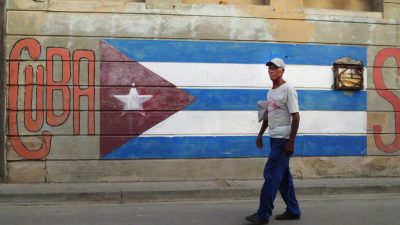Human Rights Rhetoric at the UN Is Not Enough to Combat the US Blockade on Cuba

The latest tightening of US sanctions on Cuba which have led to a fuel crisis in the country, expose the futility of UN diplomacy when it comes to upholding its own definitions of international law. Since 1962, Cuba has been targeted by an economic blockade that crippled its possibilities for trade and development. However, US influence within the international community continues to ridicule the concept of human rights and independence.
Cuban Foreign Affairs Minister Bruno Rodriguez Parilla has recently described the US blocking fuel entry to Cuba as genocide. US-imposed fines upon vessels reaching Cuba have caused a shortage, leading the Cuban government to announce coping measures which have affected daily life for the people.
Meanwhile, further financial restrictions imposed by the US on Cuba were described by US Treasury Secretary Steve Mnuchin as holding “the Cuban regime accountable for its oppression of the Cuban people and support of other dictatorships throughout the region, such as the illegitimate Maduro regime.” The sanctions, Mnuchin said, “are curbing the Cuban government’s bad behaviour while continuing to support the long-suffering people of Cuba.”
Never mind that the Cuban people have suffered since the imposition of the blockade and subsequent attempted interference under the guise of USAID, which lately sought to damage Cuba’s reputation by targeting its international health care program, despite the fact that Cuban doctors have been at the helm of providing much needed assistance in the region and worldwide.
Undoubtedly, the US is attempting to damage relations between Venezuela and Cuba in an attempt to bring both countries to the brink of political surrender. US intervention in Venezuela has hit Cuba as a result, which has affected the supply of oil to Cuba. For the US, the bonus would be a permanent presence in both countries, subjecting the people to perpetual subservience.
According to Rodriguez, Cuba has incurred up to $4.3 billion in financial losses between March 2018 and April 2019. In six decades of US sanctions on Cuba, $922.6 billion have been lost.
UN General Assembly President declared the organisation’s stance on the US blockade: “These unilateral sanctions really affect security and the right to development of all peoples, and represent an obstacle to the capacity to carry out those benefits.”
Since 1992, the UN has annually voted on a resolution to end the US embargo on Cuba. Last year, former US Ambassador to the UN Nikki Haley criticised the vote while reminding, “You’re not hurting the United States.”
Indeed, the US cannot be hurt by UN actions because its acts above international law as a matter of policy. Additionally, the non-binding resolution does not coerce the US to rescind its political violence, thus rendering the process an exercise in futile diplomacy. Cuba is in need of action, rather than discussion and deliberation. Despite the fact that international consensus on lifting the blockade is generated repeatedly, the violations remain in place while the Cuban government is constantly required to defend the socialism which has infuriated the US even after revolutionary leader Fidel Castro’s death.
The Cuban Ambassador to Ethiopia highlighted US aggression against Cuba in terms of the oil shortages which the country is currently experiencing. Tellingly, the US is manipulating Cuba’s need for fuel to bring down the Cuban Revolution. One of the ways in which the US seeks to destroy Cuba – always in the name of protecting the people from alleged human rights violations – is through installing a right-wing government in Venezuela which would sever ties with the island. In turn, Cuba’s isolation in the region would become more pronounced.
In failing to take into consideration the relations between Cuba and Venezuela, the international community is heaping additional constraints on the Cuban people. Within the international community there is support for the Venezuelan opposition from countries which vote against the US blockade on Cuba. If the international community intends to support the Cuban struggle against imperialist policies, it cannot choose to ignore its role in oppressing the Cuban people by failing to take a stance against US interference in Venezuela.

